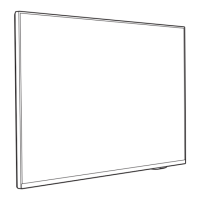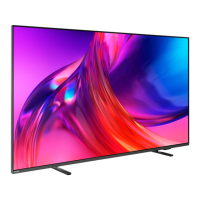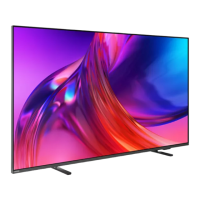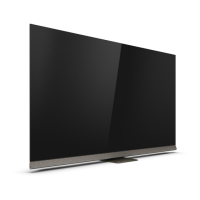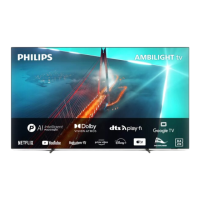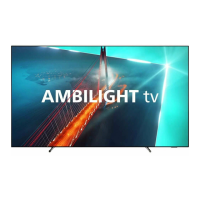Do you have a question about the Philips The One 8919 Series and is the answer not in the manual?
Overview of the Home screen's key tabs like Home, Channels, Apps, and Search.
Details on the first row of the Home screen showing pre-installed and favorite applications.
Explains the row featuring recommended content from YouTube and Netflix.
How to access All Settings, Frequent settings, and Quick menu from the Home screen.
Instruction to open the TV Guide for installed TV channels.
Find TV model/serial number and register your product for benefits.
Accessing TV information, how-to guides, diagnostics, and the user manual.
Running diagnostic tests to check TV condition and configurations.
Contacting support for repair services and finding product information.
Overview of the remote control's keys and functions, including hidden keys.
Importance of reading safety instructions before using the TV.
Tips for optimal TV placement, including distance and wall mounting.
Instructions on connecting the power cable and turning the TV on.
Advice on connecting devices with the highest quality cables for best picture/sound.
How to connect an antenna to the TV for TV signals.
How to connect a satellite dish to the TV for satellite channels.
Connecting video devices via HDMI for optimal picture and sound quality.
Connecting audio devices, including options like HDMI ARC/eARC and Optical Out.
Screen Mirroring instructions to display mobile content on the TV.
Connecting CI+ modules for conditional access to premium TV channels.
Pairing and managing Bluetooth devices like speakers and headphones.
Connecting a computer to the TV via HDMI for use as a monitor.
How to open the sources menu and switch between connected devices.
Procedure to rename connected input sources for easier identification.
How to watch TV channels, switch between them, and use the channel list.
Manual and automatic installation of antenna, cable, and satellite channels.
Setting subtitles, audio language, and other viewing options for channels.
How to open and navigate the TV's channel list.
Creating and managing lists of favorite channels for quick access.
Accessing and using Teletext services for additional information.
How to install and watch free streaming channels available via the internet.
Information on viewing current and scheduled TV programs via the TV guide.
Steps to open, navigate, and tune to programs using the TV Guide.
Introduction to Freeview Play features for accessing missed and on-demand TV programs.
Steps to open and navigate the Freeview Play interface.
Accessing the TV Guide within the Freeview Play environment.
Viewing media files stored on a USB flash drive or hard drive.
Accessing media files from a computer or network-attached storage.
Viewing, organizing, and setting up slideshows for photos from USB.
Playing video files from USB, including subtitle and audio options.
Playing music files from USB, with playback and shuffle options.
Accessing quick settings, help, and frequently used TV functions.
Navigating the comprehensive settings menu for picture, sound, and other TV configurations.
How to launch and close the gaming control bar for enhanced gaming.
Display of key gaming information like input lag, frame rate, and resolution.
Adjusting game-specific settings such as crosshair, shadow control, and audio output.
Initial configuration and agreement to terms for using the Smart TV features.
Browsing, downloading, and installing applications from the TV's app store.
Introduction to Amazon Alexa voice control on the TV and requirements.
Step-by-step guide to set up and use Alexa voice commands on the TV.
Examples of voice commands for controlling TV functions with Alexa.
Methods for updating TV software via internet or USB for new features and fixes.
How to check the current installed TV software version.
Enabling or disabling automatic software updates for the TV.
Checking the list of successfully installed software versions.
Information on the TV's energy efficiency class and consumption.
List of EPREL registration numbers for different TV models.
Guidelines for proper disposal of the product and its batteries.
Technical details regarding power requirements and ambient operating temperature.
Specifications for TV tuner bands, video/audio playback, and satellite input.
List of diagonal screen sizes and the TV's native display resolution.
Supported computer and video resolutions and their corresponding refresh rates.
Output power and supported audio technologies like Dolby Atmos and DTS:X.
Supported connections, USB file systems, video/audio codecs, and subtitle formats.
Details of all available TV side and bottom connectivity ports.
General advice for finding solutions and accessing support resources.
Steps to troubleshoot issues when the TV does not switch on.
Troubleshooting steps for when the TV does not respond to the remote control.
Solutions for issues like no digital channels found or disappeared channels.
Troubleshooting satellite reception problems and channel finding issues.
Solutions for no picture, distorted picture, or picture issues from external devices.
Troubleshooting steps for no sound or poor sound quality, including DTS issues.
Resolving issues related to HDMI connections and Ultra HD signal quality.
Troubleshooting problems with USB devices not showing media or choppy playback.
Solutions for Wi-Fi network issues, internet connectivity, and slow PC/internet.
Steps to change the TV menu language back to the correct one.
Important safety instructions to prevent electric shock, fire, and injury.
Guidelines for cleaning the TV screen and avoiding damage from stationary images.
Trademark information related to HDMI technology.
Information on patents related to HEVC decoding.
Information on AMD FreeSync Premium technology for gaming.
Trademark and patent information for DTS Play-Fi.
Trademark and patent information for DTS:X audio technology.
Trademark and licensing information for Dolby technologies.
Trademark information for the Wi-Fi CERTIFIED logo.
General statement about other registered and unregistered trademarks.
Information about the availability of open source software used in the TV.
Details on the licenses governing the open source software components.
| Display Technology | LED |
|---|---|
| Operating System | Android TV |
| HDMI Ports | 4 |
| USB Ports | 2 |
| Screen Size | 55 inches |
| Resolution | 4K Ultra HD (3840 x 2160) |
| Smart TV | Yes |
| HDR Support | HLG |
| Audio Output | 20W |
| Bluetooth | Yes |
| Sound Technology | Dolby Atmos |
| Refresh Rate | 60Hz |
| Wi-Fi | Yes |


